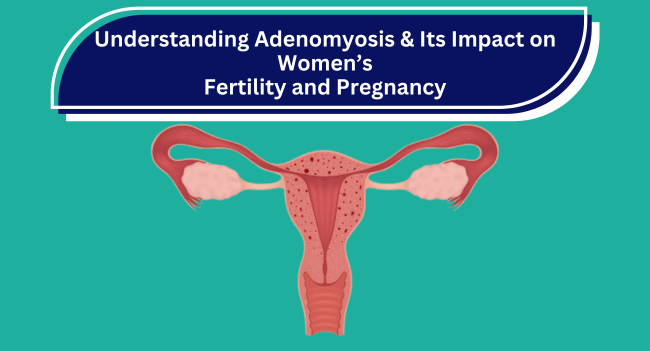
Successful pregnancy with adenomyosis is a possibility, though the condition can pose challenges.
Adenomyosis is a medical condition that occurs when the endometrial tissue grows abnormally into the muscular wall of the uterus.
This abnormal growth leads to the thickening and enlargement of the uterus, which can cause excessive bleeding and painful periods. The condition is prevalent among women of reproductive age.
Adenomyosis can cause menstrual cramps, abdominal pressure in low abs, bloating before menstrual periods, and heavy periods. Some theories suggest that adenomyosis may result from developmental defects after childbirth or the invasion of bone marrow stem cells into the uterine muscles, but the exact causes are unknown.
Women with adenomyosis show concern and ask, “Can adenomyosis patients get pregnant”? This blog intends to discuss some key issues, such as fertility, the connection between infertility and adenomyosis, and pregnancy-related issues in conjunction with adenomyosis.
Adenomyosis was initially not considered to have a clear connection with infertility in women.
However, with the advancement of imaging techniques like ultrasound, clinicians can better diagnose and correlate infertility with adenomyosis. Studies show that infertility is more commonly diagnosed in cases where the woman has adenomyosis coexisting with other conditions like endometriosis, leiomyoma, or polyps.
Adenomyosis makes the uterus enlarged and bulky, which reduces its ability to provide a fertile environment. Due to the distorted anatomy of the uterus, tubular transport is blocked, resulting in the blockage of sperm migration and embryo transport.
The endometrial function and receptivity are altered due to increased production of estrogen hormone and inflammation. The chances of failed implantation are high due to reduced adhesion molecules, implantation markers, and altered genetic function required for embryo development.
Adenomyosis causes symptoms that make the routine life of a woman very difficult. It is also thought to affect her ability to get pregnant negatively. However, Successful pregnancy with adenomyosis is possible, and if a woman with adenomyosis conceives, there are still high chances of miscarriage.
To diagnose adenomyosis, doctors rely on several tests that include:
The adenomyosis treatment aims to lessen or curb adenomyosis symptoms and negate its impact on a woman’s fertility or pregnancy (if the woman has conceived). The treatments are as follows:
Medical Management:
Adenomyosis can adversely impact IVF treatment as implantation is impaired due to the thickened myometrium, abnormal expression of adhesion molecules, lower endometrial receptivity, and altered expression of gene HOXA10. Assisted reproductive technology (ART) includes IVF and ICSI, which are the procedures used for the treatment of infertility by the handling of eggs, embryos, or sperm.
Hence IVF experts would recommend the adenomyosis treatment first to manage its symptoms and tissue outgrowth before trying for conception with IVF.
Adenomyosis is a life-altering condition that can cause pain, heavy bleeding, and exhaustion. It’s important to seek medical attention and find a compassionate team to help you. Though there is still much to understand about adenomyosis, Dr. Partha Das can provide answers and support to help you along your journey.
Dr. Partha Das has around 18 years of experience in dealing with gynecological, infertility, and genetic cases and has helped several couples become parents.
Discuss your gynecological issues in a one-on-one setting with Dr. Partha Das.

Dr Partha Das is a highly skilled fertility/IVF Physician specializing in Reproductive Endocrinology and Infertility. Dr Partha consults and manages patients presenting with complex gynecological, male and female infertility issues and management of recurrent miscarriage and IVF failures.